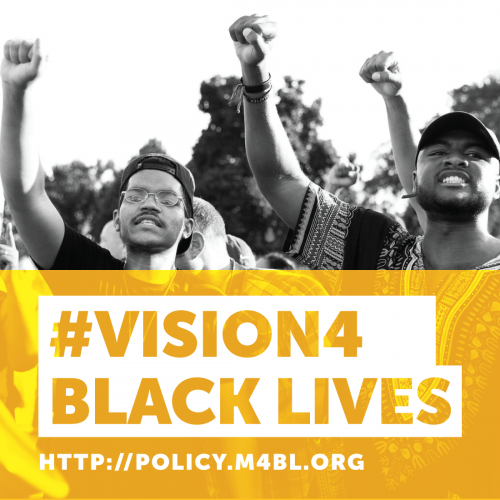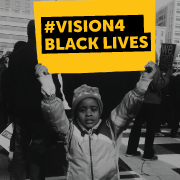EDITED June 2020 to update links in the M4BL web site.
Under the name Movement for Black Lives , a coalition of contemporary Black Power organizations (including Madison’s Freedom, Inc.) have worked for a year to develop a comprehensive vision and agenda for social change. This is an exciting moment for both activists and academics. We are watching a new movement take shape before our eyes.
 While this agenda is distinctively and unapologetically Black, it is also an agenda for a broad-based multi-ethnic coalitional movement for social justice. The agenda involves six major policy areas, each with a series of more specific demands and each of these backed up by longer policy papers (I count 39 in all) that document the justification for the policy proposals. The whole thing is presented in an accessible web format and the roll-out included a well-organized mass media and social media campaign. This is serious. In this post I will summarize the overall agenda and then in subsequent posts will look in more detail at each of the six areas.
While this agenda is distinctively and unapologetically Black, it is also an agenda for a broad-based multi-ethnic coalitional movement for social justice. The agenda involves six major policy areas, each with a series of more specific demands and each of these backed up by longer policy papers (I count 39 in all) that document the justification for the policy proposals. The whole thing is presented in an accessible web format and the roll-out included a well-organized mass media and social media campaign. This is serious. In this post I will summarize the overall agenda and then in subsequent posts will look in more detail at each of the six areas.
The preamble says in part: “We are a collective that centers and is rooted in Black communities, but we recognize we have a shared struggle with all oppressed people; collective liberation will be a product of all of our work. We believe in elevating the experiences and leadership of the most marginalized Black people, including but not limited to those who are women, queer, trans, femmes, gender nonconforming, Muslim, formerly and currently incarcerated, cash poor and working class, differently-abled, undocumented, and immigrant. We are intentional about amplifying the particular experience of state and gendered violence that Black queer, trans, gender nonconforming, women and intersex people face. There can be no liberation for all Black people if we do not center and fight for those who have been marginalized. It is our hope that by working together to create and amplify a shared agenda, we can continue to move towards a world in which the full humanity and dignity of all people is recognized.”
The six areas are (with links to the relevant section of the web site):
- End the War on Black People This includes a sweeping agenda ending the criminalization of Black youth in all sectors, including education and culture as well as criminal justice and reallocating funds from punitive to restorative policies; ending capital punishment; ending money bail; enduing use of criminal history in eligibility for housing, jobs loans, etc.; ending war on Black immigrants; ending war on Black trans, queer and gender nonconforming people; ending mass surveillance of Black communities; demilitarization of law enforcement; end privatization of police, prisons and all other criminal justice services; improved conditions in all incarceration facilities.
- Reparations. This includes free and open access to advanced education and forgiveness of student loans; guaranteed minimum livable income; healing ongoing physical and mental trauma and ensuring access and control of food, housing, land; school curricula that recognize the effects of colonialism and slavery and preserve and restore cultural assets and sacred sites that honor collective struggles; pass HR 40, Commission to Study Reparation Proposals for African Americans Act, to study and address impacts of slavery;
- Invest-Divest.This includes reallocation of funds from policing & incarceration to education, restoration, and employment; retroactive decriminalization and release and record expungement for all drug and prostitution offenses, reinvesting savings into restorative, mental heal, and job services; “real, meaningful and equitable universal health care” that includes culturally competent services and services for queer, gender nonconforming and trans people; paid parental leave and child and elder care; constitutional right to full free education, culturally appropriate curriculum, freedom from unwarranted search; divestment from fossil fuels; cut in military expenditures; support alternative Black institutions.
- Economic Justice. Progressive restructuring of tax codes; federal and state job programs; right to restored land, clean air, water, and housing; right to organize especially in “on demand economy” jobs; restore Glass-Steagall Act and change credit union law to allow for small banks and small credit unions, insurance companies and other institutions; end Trans-Pacific Partnership; use tax and other incentives to facilitate trade across and in Black communities globally; financial support of Black alternative institutions; protections for workers, especially domestic, farm, tipped workers.
- Community Control. Direct community control of law enforcement agencies; end privatization of education and real community control of education; participatory budgeting at all levels.
- Political Power End criminalization and repression of Black political activity and release Black political prisons; end repression of political parties; public financing of elections and ending super PACs and corporate donations; electoral protection and right to vote for all people through universal voter registration, enfranchise formerly and presently incarcerated people; local and state resident voting for undocumented people; ban on disenfranchisement laws; net neutrality and universal Internet access; fund Black institutions including Historically Black Colleges and Universities and Black media.
As I typed up this summary, I could see that some of the bullet points in the agenda are very specific while others are themselves collections of broad and diffuse issues. In subsequent posts I will work through the details, looking at the details of the demands and proposals and looking for connections to other movements and organizations.
The 2020 Update also includes two rapid-response position papers on COVID 19 and the rights of protesters.
Links: main web page https://m4bl.org/policy-platforms/
You can read longer policy statements in each of the six areas by clicking on the area. There are also PDF versions of longer policy statements supporting this agenda available in each of these six spaces. (My only criticism of the web site is that there isn’t a single download available of the whole package all policy documents together.)

